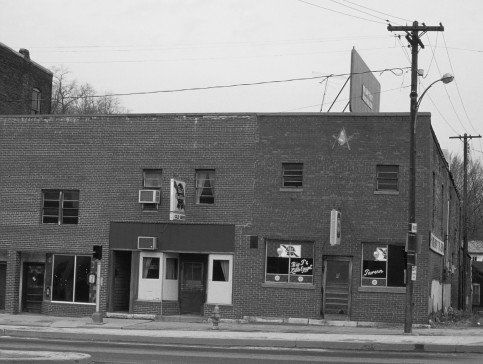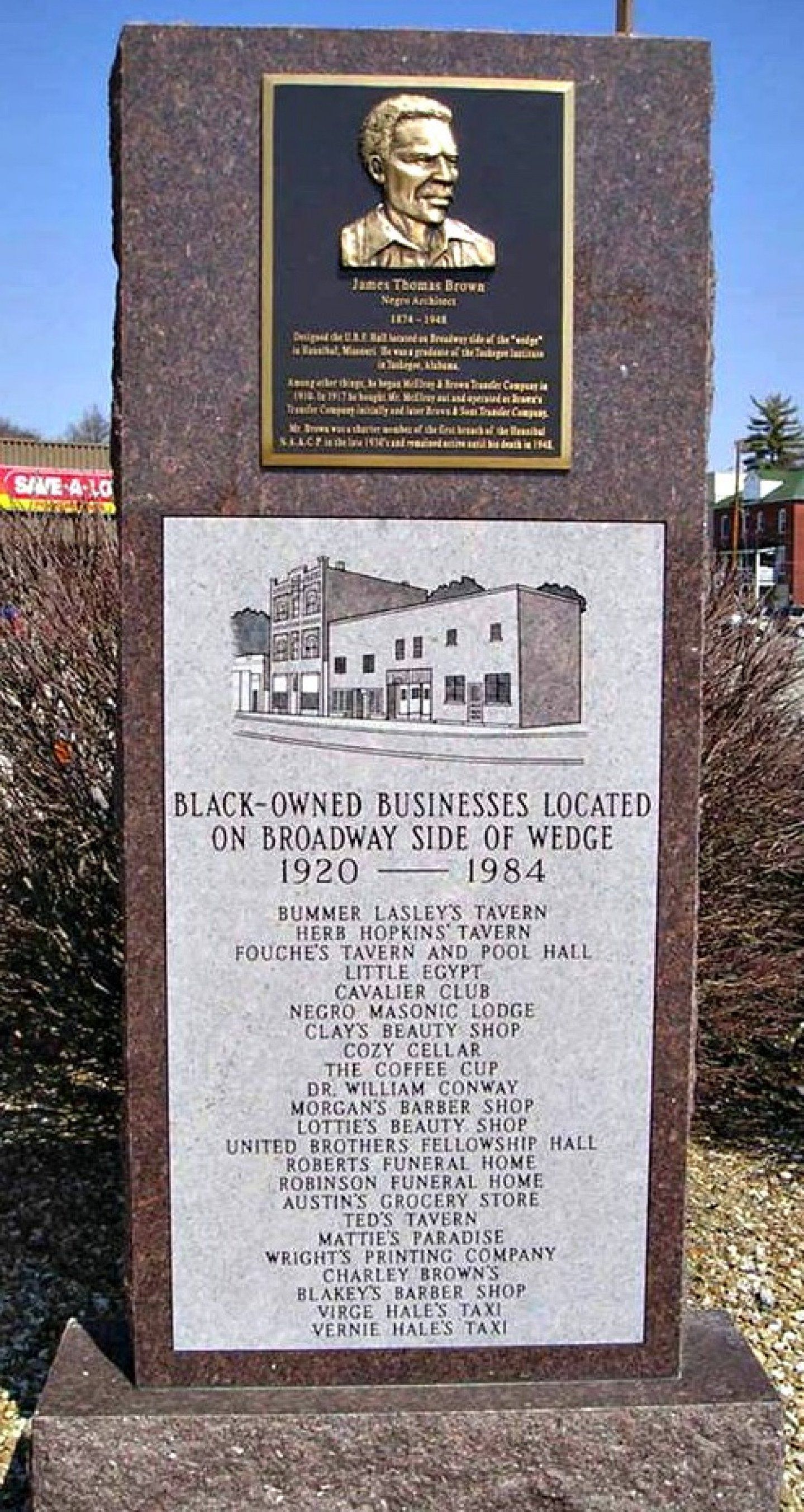"THE WEDGE," HANNIBAL'S PROMINENT BLACK-OWNED BUSINESS DISTRICT FOR MORE THAN 80 YEARS.
Hannibal's Black-owned Businesses
It is an interesting irony that African American businesses in the early twentieth century benefited greatly from the unlikely foe of segregation. Jim Crow laws in housing contributed to self-contained neighborhoods where African American businesses and professionals flourished as they catered to the economic needs of their neighbors. Most of these structures have been demolished or significantly changed.
*Indicates that the structure still stands.
• 302 S. 5th Street, Earl Harris Undertaker
• 410 N. 9th Street, P.F. Dealy Grocery
• 413 N. 9th Street, Isaac Haley Trucking
• 900 N. 9th Street, Crystal Ice Company
• 600 15th Street, McElroy Hot Tamale Vendor
• 216 S. Arch Street, M.A. Lewis, Douglass School, Principal
• 112 Bird Street, Green's Spotless Kitchen
• 306 Broadway, Joseph Pelham, Notary Public
• 514 Broadway, Washington Donley Restaurant; Black's Barber Shop
• 2720 Carrol Street, Ruben Stallings Trucking
• 210 Center Street, Home Protective Newspaper*
• 1216 Center Street, Dr. Fox, Surgeon/Pharmacist
• 1618 Center Street, Robinson Mortuary
• 1217 Church Street, Dr. H.B. McMechen*
• Church and 11th, Austin Grocery Store
• 1328 East Gordon, Brown's Tavern
• 1330 East Gordon, Uncle Tom's Cabin (bar)
• 180 Green Street, Elite Grocery
• 1218 Girard, American Legion Post #55
• 1328 E. Gordon Street, Willie Reed Pool Hall
• 2006 Gordon Street, Poro Beauty Parlor
• 1 Hoggs Row, Howard's Café
• 9 Hoggs Row, Blakey's Grocery
• 110 Hill Street, Amber Transfer
• 115 Hill Street, Shamrock Rooming House
• 115 Hill Street, Blue Haven Rooms
• 118 Hill Street, Perry Ambers Transfer
• 807 Hill Street, Brown and Sons Transfer*
• 2103 Irvin Street, Harris Grocery
• 408 Lemon Street, Walter White Café
• 600 Lemon Street, Huff's Grocery; Jiffy Cleaners- Major Griggsby, Jr.,
•1325 Lyon Street, Dr. O.C. Queen, physician; Dr. Manzilla Queen, dentist; Velma Queen, teacher
• 115 Lyon Street, McElroy and Brown Transfer
• 1112 Lyon Street, Spotless Green Café; Campbell's Tea Room
• 1033 Lindell Avenue, 879 Taxi
• 1237 Market, Market Street Shinning Parlor
• 2250 Market Street, Fitz's Lounge
• 1631 Market Street, Harris Rooming House; Hannibal Director; Kyer • Café; Fugate Barber Shop; Sephus Funeral Home
• 1731 Market Street (R), Dr. Conway, Dentist
• 1731 Market Street, Dr. Fox, Physician/Surgeon
• 920 North Street, Hannibal Register Newspaper
• 926 North Street, Campbell's Transfer
• 1003 North Street, Diggs Grocery
• 1106 North Street, Harry Givens Trucking
• 1216 North Street, Earl Harris Undertaker, Hannibal Director-Eugene Lucas, Publisher; Harris Rooms
• 318 N. Main, Texas Café, Fred Long Restaurant (1922-1930?)*
• 318a N. Main, Long's Hotel
• 405 N. Main, Palace Barber Shop, Major Turner, owner; King Barber Shop & Pool Hall
• 1402 Paris Avenue, Redmond Transfer
• 1516 Pleasant, Henderson Transfer
• 1108 Rock Street, David Anderson & Sons Trucking
• 205 S. Main, J. Cartwright Restaurant
• 206 S. Main, John Price Billiards*
• 317 S. Main, Southside Shoeshine Parlor
• 1920 Texas, Williams Transfer
• 111 Wardlaw, Grants Colored Nursing Home
• 618 Wardlaw, Miss Cleotha Transfer
•Outskirts of Hannibal, U.B.F. Home; Masonic Home
Memorial Plaque
At the Wedge, Located Where Boadway and Market Streets Converged, Most of Businesses on the Broadway Side Were Owned and/or Operated by African Americans.
Above: This Memorial Plaque, Donated by the City of Hannibal, Is All That Remains of the Wedge. It Pays Homage to the Many Entrepreneurs Operating in the Area From 1920 to 1984, Just Before Its Demolition Began. The Memorial Was Erected in 1985 by the City of Hannibal in Response to Community Efforts Led by Reverend Minnie Smith of Willow Street Christian Church.
Businesses on the Broadway Side The Wedge
• 1208 Broadway: Elite Tavern, Fouche's Tavern and Pool Hall; Little Egypt Bar; Rose Garden; Hobbs Grocery; Lewis Smokehouse; Bummer Lasley's Tavern
• 1208 1/2 Broadway: Negro Masonic Lodge
• 1210 Broadway: Dr. R.E. Long; Clay's Barbershop
• 1212 Broadway: Mattie's Paradise, Blakey's Barbershop
• 1214 Broadway: Clay's Barbershop; Lottie's Beauty Shop; Morgan Barbershop
• 1214 ½ Broadway: United Brothers Fellowship Hall
• 1216 Broadway: People's Grocery, John Austin, De-Luxe Lunch; Dixon's Café; Herb Hopkin's Tavern; The Coffee Cup; Ted's Tavern
• 1218 Broadway: George Roberts Funeral Home; Robinson Mortuary
• 1230 Broadway: Odd Fellows Hall; Cavalier's Club; Vergie and Vernie Hale's Taxi
• 1234 Broadway: Taylor Café
In the post-Civil War years immediately following emancipation, African American men, women, and children worked as farm hands, laborers, and servants for white Hannibalians. Census records from 1930 indicate that almost 90% of black women in the labor force were employed as domestics, nurses, nannies, maids, or laundresses. Black residents helped shape the city's economy and infrastructure despite the fact that the prejudice and discrimination they faced remained a not-so-subtle undercurrent.



